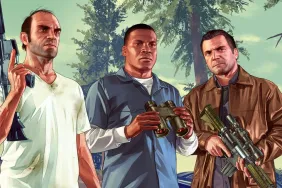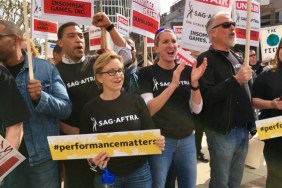With negotiations for the new SAG-AFTRA (Screen Actors Guild – American Federation of Television and Radio Artists) Interactive Media Agreement at a standstill after it expired at the end of 2014, a vote on whether to strike is running until October 5.
Over on the SAG-AFTRA website, they reveal that the original agreement was first negotiated in the mid-1990s and is still the template for what companies use today. After two unsuccessful meetings with noteworthy companies like EA, Activision, Disney, Warner Bros earlier this year, SAG-AFTRA revealed the four key issues that make up their proposal package: Performance Bonuses, Vocal Stress, Stunt Coordinator on Performance Capture Volume, and Transparency.
While the Performance Bonuses part is fairly straightforward (if a game sells millions of copies, the actors should benefit), Vocal Stress is described as a stunt pay of sorts:
We believe actors should get stunt pay for vocally stressful recording sessions the same way they get stunt pay for physically demanding roles. That’s why we’re proposing to limit “vocally stressful” recording sessions to two hours at the same union minimums.
Referencing an incident where a voice actor was doing performance capture without a stunt coordinator on set, and one of the developers tried to do a wire pull that ended up injuring the actor, SAG-AFTRA simply asks to have a stunt coordinator on set. “Stunt coordinators also help train actors how to fight, do stunts and combat and perform motion capture properly so they look more realistic in the game,” they add.
As for Transparency, they want to know more about the projects the actors are working on, including the actual title of the project. They’d also like to know the following at some point: “How many sessions are you expecting to book? What rating are you planning to get? Why? Is there offensive content? Will the sessions be vocally stressful?”
In the FAQ section of their website, SAG-AFTRA reveals that strike votes are confidential and, if it does go through after receiving more than 75% of support from the voters, “we will reach out to the employers and ask them to return to negotiations” before fully striking.
If the strike does become a reality, voice actors won’t be allowed to work:
No. You will not be able to work under the interactive contract while the strike is in effect. But please know, the community would only decide to strike if the short-term risk of loss-of-work is outweighed by the long-term gain of a better contract in a growing industry.
Based on the support received from many popular voice actors, it seems the strike could happen:
Dear actors & gamers, Please retweet if you agree that #PerformanceMatters in video games. #IAmOnBoard2015 pic.twitter.com/xZAT0MOfcY
— David Hayter (@DavidBHayter) September 22, 2015
I love voice acting in video games, but our employers don’t seem to think #PerformanceMatters, so I voted YES to strike. #iamonboard2015
— Wil Wheaton (@wilw) September 22, 2015
voted YES bc #performancematters #Iamonboard2015 pic.twitter.com/RxsdD1S1Zj
— Jennifer Hale (@jhaletweets) September 22, 2015
Sag-Aftra Interactive performers! Please vote! http://t.co/CRlyD4lLrz #PerformanceMatters pic.twitter.com/rRsncZZUyo
— Steve Blum (@blumspew) September 22, 2015
Voting today w/ my fellow vid game performers – united for a fair contract #PerformanceMatters #iAmOnBoard2015 pic.twitter.com/Wmu5O5b28s
— phillamarr (@phillamarr) September 22, 2015
I voted yes! (But forgot my card so here is a thumbs up) #PerformanceMatters #iAmOnBoard2015 pic.twitter.com/HUPNrC36yW
— Ashly Burch (@ashly_burch) September 22, 2015
According to Game Informer, both sides are undergoing a media blackout.
[Source: SAG-AFTRA via Games Industry, Game Informer]








